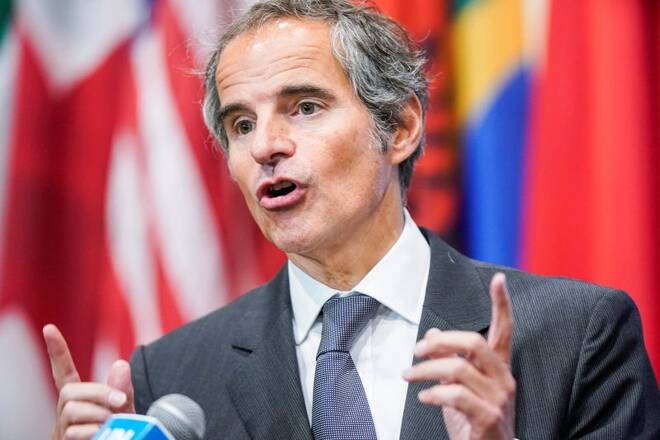Advertisement
Advertisement
IAEA chief hopes for crunch meeting in Iran after Tehran says it’s off
By:
By Francois Murphy VIENNA/DUBAI (Reuters) - U.N. nuclear watchdog chief Rafael Grossi said on Wednesday he hoped a meeting with Iran later this month to end an impasse over traces of uranium found at undeclared sites would proceed after Iran's nuclear chief reportedly said it was not "on the agenda".
By Francois Murphy
VIENNA/DUBAI (Reuters) – U.N. nuclear watchdog chief Rafael Grossi said on Wednesday he hoped a meeting with Iran later this month to end an impasse over traces of uranium found at undeclared sites would proceed after Iran’s nuclear chief reportedly said it was not “on the agenda”.
“I hope our planned technical meeting with Iran takes place,” Grossi said on Twitter.
He said at a news briefing moments later that he was responding to a comment by Iran’s nuclear chief Mohammad Eslami, reported by state media. Iran has not made such remarks directly to the IAEA, he added.
The International Atomic Energy Agency’s years-long investigation into the particles is now stalled, and both sides have agreed to meet in Tehran, with the IAEA saying it “expects to start receiving from Iran technically credible explanations” on how the particles got there.
The issue has been an obstacle to progress in wider talks to revive the 2015 Iran nuclear deal, and has prompted Western powers to push for a fresh resolution targeting Iran at the IAEA’s 35-nation Board of Governors meeting this week, this time ordering Iran to quickly answer the IAEA’s questions.
Eslami’s comments appeared to be in response to the draft resolution prepared by the United States and the so-called E3 – Britain, France and Germany – that the board will vote on this week. A similar resolution was passed by a large margin in June.
“For now, there is no trip of the IAEA to Iran on the agenda. Considering Iran’s goodwill and its logical answers, we can hope for good results if the agency follows a professional and non-political path,” Iranian state media quoted Eslami as saying on Wednesday, the opening day of the IAEA board meeting.
Eslami added that Iran rejects the draft resolution, which says the board “decides it is essential and urgent” for Iran to give the IAEA the answers and cooperation it seeks.
Asked what it would mean if the meeting did not happen, Grossi said: “Well, it would make things even worse than they already are. We are not making progress.”
(Additional reporting by Dubai Newsroom and John Irish in Paris; Editing by Toby Chopra and Bernadette Baum)
About the Author
Reuterscontributor
Reuters, the news and media division of Thomson Reuters, is the world’s largest international multimedia news provider reaching more than one billion people every day. Reuters provides trusted business, financial, national, and international news to professionals via Thomson Reuters desktops, the world's media organizations, and directly to consumers at Reuters.com and via Reuters TV. Learn more about Thomson Reuters products:
Latest news and analysis
Advertisement
